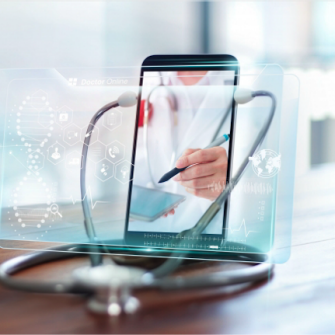Enhanced virtual care through remote monitoring
How a pioneering health app is revolutionising patient experiences and outcomes.

Share this story
Through the creation of the evidence-based remote patient monitoring platform, TeleClinicalCare (TCC), Professor Nigel Lovell has enabled a new way for patients and practitioners to deliver post-discharge continuity of care. This innovative smartphone app and clinician monitoring portal is not only reducing instances of re-hospitalisation but also saving lives.
TeleClinicalCare (TCC) Mobile App.
As the head of the Graduate School of Biomedical Engineering and the Director of the Tyree Foundation Institute of Health Engineering (IHealthE) at UNSW, Prof. Lovell’s primary goal has been to address unmet patient needs through the application of innovative med-tech solutions. This aim has come to life more recently through the creation of TCC, which enables self-management, reduces unnecessary re-hospitalisations and ultimately improves patient wellbeing.
At a time when smartphones started becoming more ubiquitous, Prof. Lovell began sourcing low-cost physiological monitors such as pulse oximeters and blood pressure graphs with the idea of using the smartphone as the integrator for the data they would produce. This would form the front end of his TCC app and also deliver questionnaires and education material to patients. At the backend, the app would provide clinicians and health administrators with access to a patient clinical portal. This allowed them to view the longitudinal measurements from patients and run a health-risk stratification algorithm across all the data, revealing who was at risk of exacerbations of their conditions, and prioritise patients based on assessments of their health.
Trialled across a study of 160 cardiovascular patients, the app proved successful – showing a 50 per cent reduction in patient readmissions to hospital after six months.
"By running a service that tracks health remotely, we could intervene at appropriate times and reduce patients having to come back into hospital by a factor of half compared to those who weren’t monitored."
- Professor Lovell
Connected health during the pandemic
With the onset of the COVID-19 pandemic, Prof. Lovell and his clinical partner, Associate Professor Sze-Yuan Ooi, Director of the Coronary Care Unit and Senior Staff Cardiologist at Prince of Wales Hospital, modified the app from managing conditions such as heart failure to managing COVID-positive patients. “Usually this stuff takes years – we did it in six weeks,” adds Prof. Lovell.
As part of the TeleClinicalCare – COVID-19 (TCC-COVID) service, roughly 8000 patients were given access to the app, as well as a pulse oximeter to measure blood oxygen saturation and pulse rate, and daily symptom questionnaires. These triggered alerts in the instance of patient deterioration or absence of answers after a 24-hour period. This data was then collected by the South East Sydney Local Health District (SESLHD) and remotely analysed at Prince of Wales Hospital.
Elderly patient using the app.
“A key challenge during the COVID-19 pandemic was to monitor large numbers of cases safely and efficiently, while managing any additional demands that might be placed on emergency and inpatient services,” says A/Prof Ooi. “The TCC-COVID system aimed to help address these needs, linking community-based patients with hospital specialists.”
Having the ability to safely monitor isolated patients from home not only allowed hospital resources to remain available to the most critical patients but ensured personalised care by an experienced medical team.
“There’s a lot of data that showed people felt much safer and secure having contact and knowing that if their vital signs deteriorated, someone was watching."
- Professor Lovell
TeleClinicalCare (TCC) Mobile App.
Evolving the app
Following the success of the TCC-COVID app, the SESLHD Virtual Care team chose the TeleClinicalCare – Heart Failure (TCC-HF) program as their next remote monitoring system, while the TCC-Stroke program was also kicked-off in collaboration with the Head of Stroke at Prince of Wales. “It helps with managing people who are recovering from stroke and looking at stroke risk by monitoring their ECGs,” explains Prof. Lovell. “There’s a certain ECG rhythm called atrial fibrillation, which means patients are more likely to have another stroke,” he adds. Given atrial fibrillation is highly prevalent and very hard to detect from a single lead, the potential outcome of this work is particularly important.
In continuing the development of the app technology, Prof. Lovell hopes to help patients with a range of co-existing health concerns. “The goal to use it across geriatrics and managing complex comorbidities because 75 percent of those aged 65 and over will have one or two chronic diseases throughout their lifetime,” says Prof Lovell.
"We want to come up with an approach that allows for the monitoring across everything.”
- Professor Lovell
Since then, the team have created modules across chronic kidney disease, gestational diabetes, neo-natal intensive care and more.
Driving change through collaboration
None of this ground-breaking work however can be done alone. Prof. Lovell has received instrumental ongoing support to develop TCC from the IHealthE Innovation and Software Foundry team and worked closely with health executives from South East Sydney Local Health district, which services thousands of patients across four hospitals. “Part of the approach is to be involved in the co-design of the solution with clinicians but also health executives and patient stakeholder groups,” he explains. “Collaboration is absolutely critical for what we do and without that, we often miss out on having the impact we desire.”
As the technology continues to develop and more iterations of the app are made available to patients and clinicians, Prof. Lovell is still driven by his desire to improve society and patient health outcomes. “What we’re trying to achieve is around this concept of working with the community, co-designing solutions that are fit for purpose and achieving those outcomes.”
Professor Nigel Lovell
Share this story
Read more
Get in touch and see what’s possible.
Ask how we can help your business, industry, or market through collaboration.



